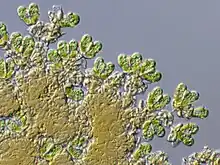CHU 13 medium is a culture medium used in microbiology for the growth of certain algal species, first published by S.P. Chu in 1942.[1] It is used as growth medium for the biofuel candidate alga Botryococcus braunii.[2]

CHU 13 includes essential minerals and trace elements that are required by algae for growth, but does not include a carbon source and so is only appropriate for growth of phototrophs. It can be prepared as either a liquid medium or as an agar medium.
| Compound | mg/L |
|---|---|
| KNO3 | 400 |
| K2HPO4 | 80 |
| CaCl2 dihydrate | 107 |
| MgSO4 heptahydrate | 200 |
| Ferric citrate | 20 |
| Citric acid | 100 |
| CoCl2 | 0.02 |
| H3BO3 | 5.72 |
| MnCl2 tetrahydrate | 3.62 |
| ZnSO4 heptahydrate | 0.44 |
| CuSO4 pentahydrate | 0.16 |
| Na2MoO4 | 0.084 |
| 0.072 N H2SO4 | 1 drop |
The remaining volume is pure, de-ionized water.
Because it is difficult to weigh out some of the trace minerals, it is advisable to create a mixture of all components at a large concentration, such as a thousand times these measures, and then mix with the appropriate amount of (pure, de-ionized) water. Correct pH to 7.5, and then autoclave.
References
- ↑ S.P. Chu (Aug., 1942) The Journal of Ecology, Vol. 30, No. 2, pp. 284-325. https://www.cpp.edu/~biodiesel/documents/reference/Chu42AlgaIsolGrowth.pdf
- ↑ C. Largeau, E. Casadevall, C. Berkaloff and P. Dhamelincout (1980) Phytochemistry, 19, 1943.
- ↑ K. Yamaguchi; et al. (1987). "Lipid composition of a green alga, Botryococcus braunii". Agric. Biol. Chem. 51 (2): 493–498. doi:10.1271/bbb1961.51.493.